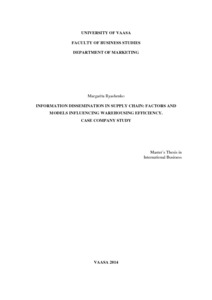INFORMATION DISSEMINATION IN SUPPLY CHAIN: FACTORS AND MODELS INFLUENCING WAREHOUSING EFFICIENCY.
Ilyashenko, Margarita (2014)
Ilyashenko, Margarita
2014
Kuvaus
Opinnäytetyö kokotekstinä PDF-muodossa.
Tiivistelmä
Purpose: Based on relationship-specific perspective and the systems of information dissemination in supply chain, this paper explores how these models facilitate the warehousing efficiency in a company that has more than two suppliers in different countries. The study examines how information flow and functioning supply chain could develop a relationship with suppliers and how those specific models and factors contribute to the firm`s inventory management. Current study is conducted from company’s point of view on supply chain management in comparison to the supplier specific requests for logistics operations.
Design/methodology/approach: In order to link theoretical part with empirical research, current study uses exploratory design and due to direct number of survey participants, research method is considered as qualitative survey method with semistructured interviews. Deductive and inductive approaches were applied in the thesis.
Findings: The result shows that factors of trust and collaboration along with implementation of information dissemination models between company and suppliers have significant importance in supply chain and might reduce the need for inventory. Improving information flow between parties in supply chain contributes to warehousing efficiency through more frequent deliveries and appropriate logistics planning.
Research limitations/implications: Study scope is limited to a single case company as well as from companies’ suppliers were chosen only five operating in different countries. Furthermore, the research focuses on one country of the case company: Finland. However, survey was conducted with suppliers from different countries and different background; the findings cannot be generalized to all the companies working in a wide supply chain. Implications of the study are presenting that information flow and such factors as trust and collaboration should be recognized as a crucial part of developing supply chain and increasing the warehousing efficiency.
Design/methodology/approach: In order to link theoretical part with empirical research, current study uses exploratory design and due to direct number of survey participants, research method is considered as qualitative survey method with semistructured interviews. Deductive and inductive approaches were applied in the thesis.
Findings: The result shows that factors of trust and collaboration along with implementation of information dissemination models between company and suppliers have significant importance in supply chain and might reduce the need for inventory. Improving information flow between parties in supply chain contributes to warehousing efficiency through more frequent deliveries and appropriate logistics planning.
Research limitations/implications: Study scope is limited to a single case company as well as from companies’ suppliers were chosen only five operating in different countries. Furthermore, the research focuses on one country of the case company: Finland. However, survey was conducted with suppliers from different countries and different background; the findings cannot be generalized to all the companies working in a wide supply chain. Implications of the study are presenting that information flow and such factors as trust and collaboration should be recognized as a crucial part of developing supply chain and increasing the warehousing efficiency.
